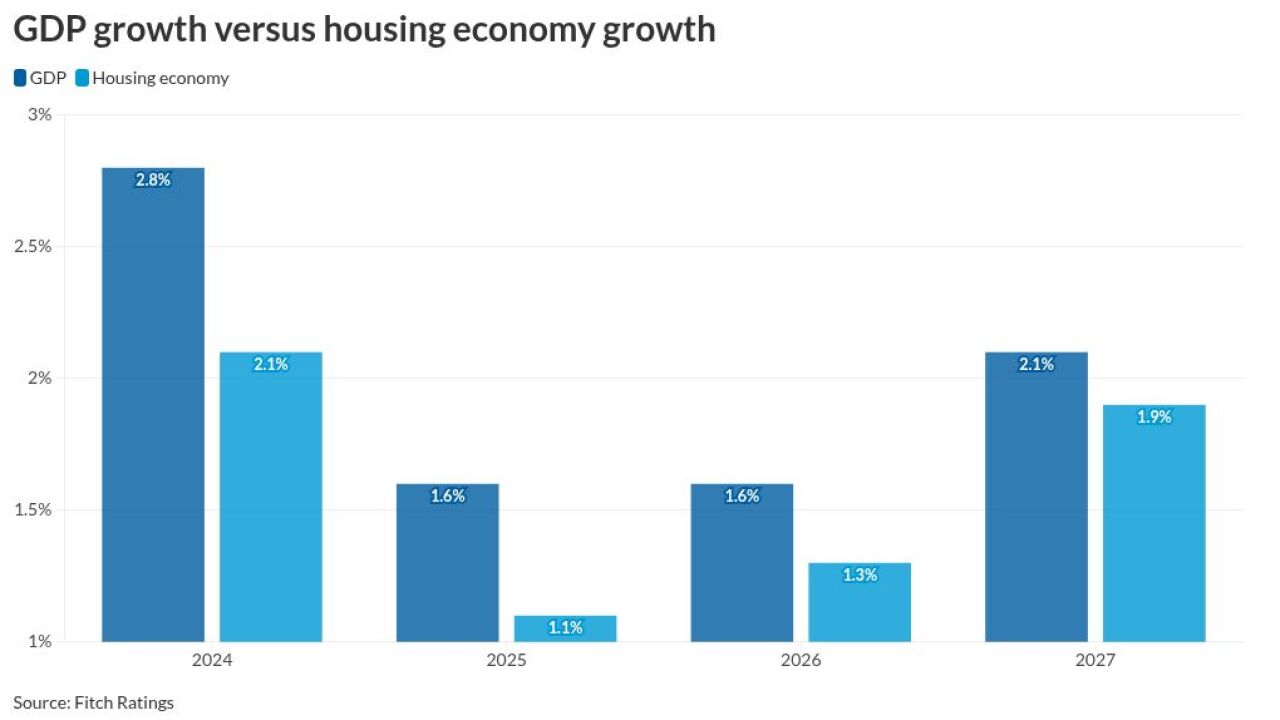Fannie Mae's chief economist is warning that the U.S. has a 40% chance of slipping into a double-dip recession in 2012.
That prediction is actually relatively optimistic for Doug Duncan, who joined the government-sponsored enterprise in 2008 after 15 years at the Mortgage Bankers Association.
A few weeks ago, he predicted a 50% chance of a double-dip recession next year, due to persistently high unemployment and the ongoing housing slump. But an uptick in job growth and stronger automotive and retail sales forced Duncan to revise his dour forecast slightly upward last week.
Duncan, who is known for being one of the most consistently pessimistic economists, does not anticipate the housing market to fully rebound before 2015. And he expects to see plenty of contagion from Europe.
"I wish there were more good news, but there's not," he told ASR sister publication American Banker in an interview this month. "Ultimately the big fear is that the euro comes apart."
One of the major problems is the housing market, he says. In past downturns, home sales have led a recovery, but this time around low interest rates have not pulled mortgage lending or consumer sentiment out of the doldrums.
Chronically high unemployment over the next decade and weak income growth will continue to expert pressure on housing prices, he says: "Until employment picks up, you won't see any improvement in housing."
The statistics for housing are particularly dire. Construction of new single-family homes remains in the tank: there were just 360,000 new housing starts this year, compared to a normal market of 1.2 million, according to Duncan.
And then there are the 2.2 million homes still working their way through the foreclosure process, which also have to find buyers eventually.
"It's just simple math," Duncan says. "It will be difficult to stimulate lots of lending activity on the part of banks without a rise in demand for products and services [such as new homes]. Banks still have to work off issues on their own balance sheets before they extend credit dramatically."
Since the run-up in housing prices took 10 years, he thinks a recovery will last just as long.
"I think we are five years through a 10-year adjustment process," Duncan says. "That's five years, and nobody believes the housing market is close to healthy today."
His predictions are resonating with some mortgage lenders. Matthew Pinenda, president of Castle & Cooke Mortgage in Salt Lake City, says he has taken Duncan's concerns to heart and is aggressively building up cash in the event of another downturn.
"How do you navigate the turmoil if it's going to get tougher?" Pineda said. "You protect your cash position, only open offices that are profitable from Day One and pay attention to what every loan costs."
Duncan has broader worries on his mind as well. He cites concerns that U.S. economic growth next year is expected to come in at an anemic 1.4% and that Europe is already mired in a recession.
Fannie's chief economist doesn't think sovereign debt holdings would "take down any U.S. bank," but he is predicting that the derivatives exposure of some investment banks could cause "a major event," akin to the collapse of Lehman Brothers in 2008.
He has some strong words for how regulators and lawmakers are handling the current economy, saying that he gets tired of what he calls "the noise in the political process."
Bankers and business executives are worried that "the other shoe is going to drop," he says, arguing that the government takes those worries less seriously than it should.
"Part of it is whether there are any other shocks that could bring the economy into recession and threaten the health of banks," he says. "There is also a question of whether all of the potential losses embedded on existing bank balance sheets have been recognized."
He pointed to high balances on home equity lines of credit in particular.
"Parties are suspicious that they haven't been written down enough," he said, adding that economists do not have enough information to take a "well-formed view," on banks' exposure.





